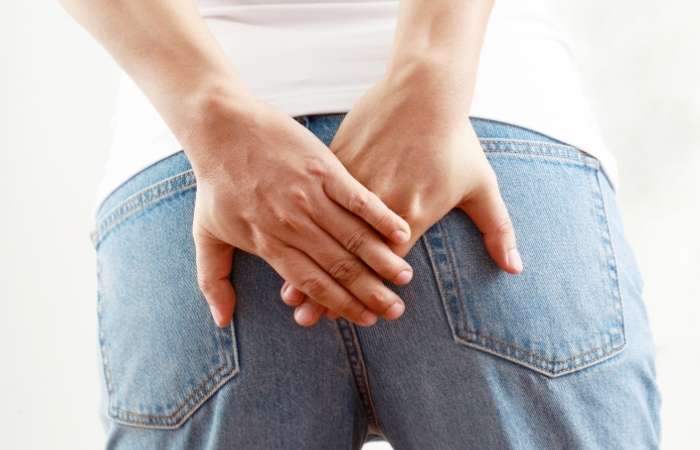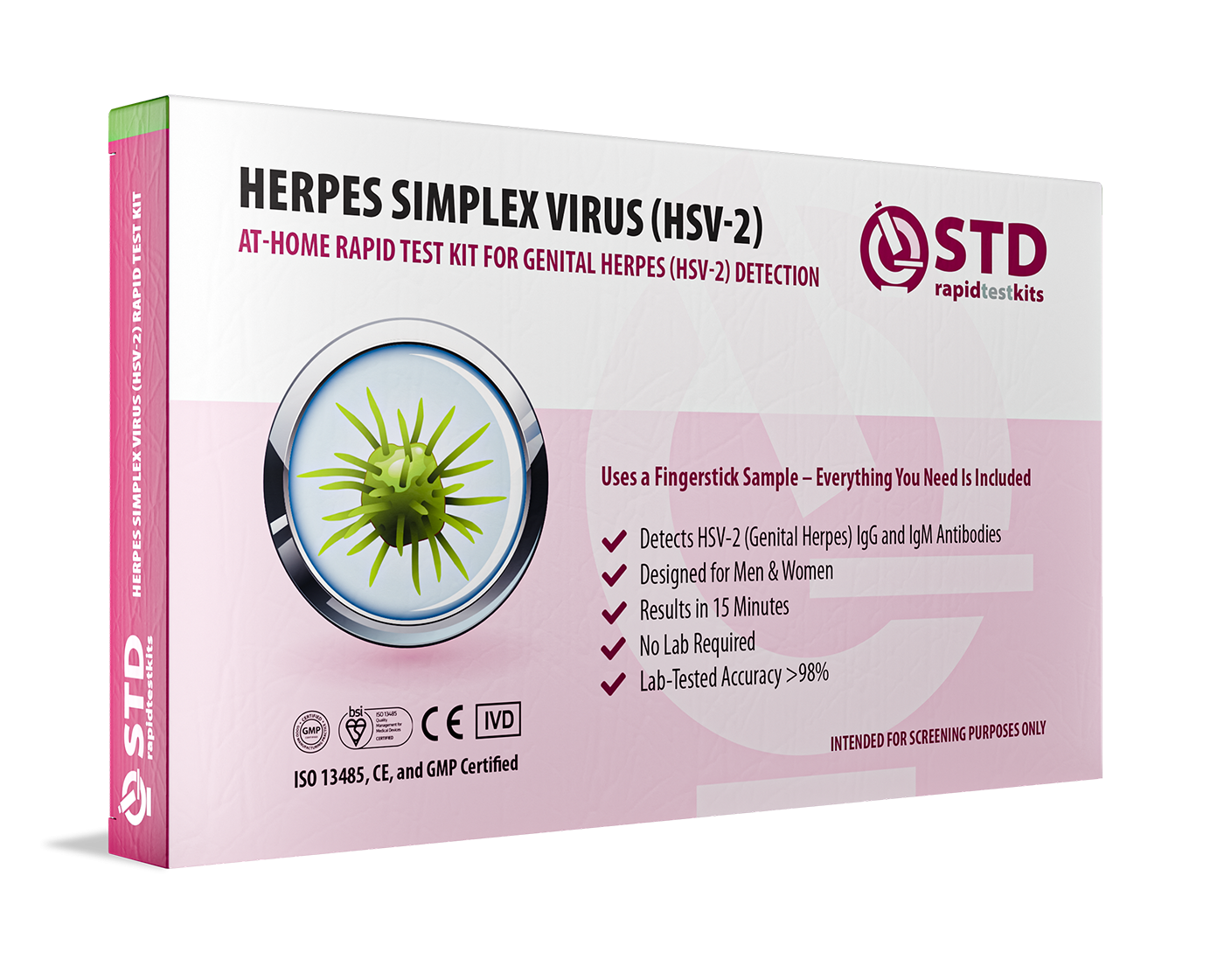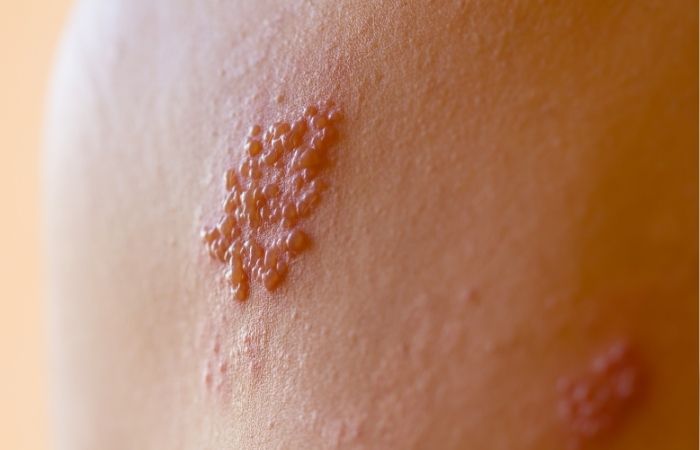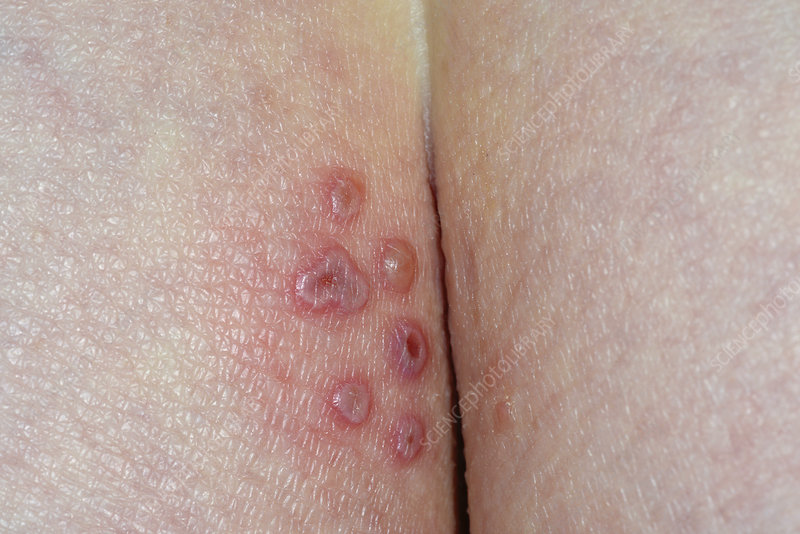Quick Answer: Anal herpes is caused by HSV-2 (or sometimes HSV-1) and spreads through anal, oral, or genital contact. It can cause painful sores, itching, or internal rectal pain. It’s common, manageable, and deserves more open conversation, and regular STD testing can catch it early.
What Is Anal Herpes, Really?
Anal herpes is a form of genital herpes that presents with symptoms around or inside the anus. It’s caused by the herpes simplex virus, usually HSV-2, though HSV-1 (typically associated with oral herpes) can also infect the anal region.
The infection is transmitted through skin-to-skin contact, especially during:
- Anal sex (with or without condoms)
- Oral-anal contact (rimming)
- Sharing sex toys without cleaning or condoms
- Touching a cold sore or genital sore, then the anal area
And here’s the kicker: you can get anal herpes without ever having anal sex. If a partner has oral herpes and performs oral-anal contact, or if genital contact spreads to nearby tissue, herpes can show up in unexpected places.

People are also reading: Does Vaseline Help Cold Sores Heal Faster?
What Does Anal Herpes Feel Like?
Symptoms of anal herpes can range from obvious to completely invisible. And because the area is sensitive and already prone to irritation (think hemorrhoids, fissures, shaving, or even toilet paper chafing), herpes symptoms often go ignored or misdiagnosed.
Common signs include:
- Itching or burning around the anus
- Small blisters or open sores near or inside the anus
- Rectal pain or pressure, especially when sitting
- Discomfort during bowel movements
- Swollen lymph nodes in the groin
- Fever, body aches, or fatigue during the first outbreak
Internal outbreaks can be harder to detect but still painful. Some people feel like they’re having a severe hemorrhoid flare, when it’s actually HSV at work.
Case Study: “I Thought It Was Just Hemorrhoids”
Jay, 31, first noticed the burning pain after a long weekend hookup with a new partner. He assumed it was friction, or maybe hemorrhoids. But the stinging didn’t go away. “I tried witch hazel pads, fiber, even sat in a salt bath,” he said. “Nothing helped. Then I saw these tiny sores near the rim of my anus, and I panicked.”
“I was mortified. I thought herpes was just something you got on your junk, not your ass.”
Jay went to a sexual health clinic. He tested positive for HSV-2. He was angry at himself for not knowing more, but his provider reassured him that this was common, manageable, and nothing to be ashamed of.
Today, Jay takes valacyclovir daily and has only had one mild outbreak since. “I wish I’d known sooner what I was dealing with,” he said. “I wouldn’t have suffered in silence for weeks.”
Why It’s Often Misdiagnosed (or Missed Entirely)
Anal herpes can look like hemorrhoids, razor burn, or even a fungal infection. That’s why so many people go undiagnosed, or misdiagnosed, especially during their first outbreak.
Common misdiagnoses include:
- Hemorrhoids: Both can cause itching, burning, and pain during bowel movements
- Fissures or tears: Herpes sores can be mistaken for small cuts or irritation
- Yeast or jock itch: Especially when the outbreak spreads near the thighs or groin
If you’re being treated for one of these but aren’t getting better, ask your provider to test for HSV. That may mean a swab of the sores, or a blood test for antibodies. You deserve an answer, not assumptions.
What Suppressive Therapy Really Means
Once diagnosed, many people panic at the idea of having herpes forever. But let’s break that down: Suppressive antiviral therapy isn’t just about managing outbreaks, it’s about reducing transmission.
Here’s how it helps:
- Lowers the number of outbreaks per year (sometimes down to zero)
- Reduces viral shedding even when no symptoms are present
- Helps prevent spreading the virus to your partners, especially when combined with barrier use
Medications like valacyclovir (Valtrex) or acyclovir are taken daily or episodically. Talk to your provider about what makes sense for you. You can still have a satisfying, safe, sexual life with herpes, don’t let stigma steal that from you.
Why Is Anal Herpes So Often Missed?
Unlike genital outbreaks, which tend to be more visible, anal herpes often flies under the radar. Here’s why:
- People don’t associate herpes with anal symptoms
- Symptoms mimic other common conditions (like hemorrhoids or fissures)
- Internal outbreaks aren’t visible in a mirror
- Shame or fear can delay seeking care
And because many clinics don’t automatically swab the anal area unless you ask, you have to advocate for yourself. That means requesting an anal swab or full-panel STD test that includes herpes, especially if you’re experiencing any unexplained symptoms down there.
Testing for Anal Herpes
The gold standard for diagnosing anal herpes is a viral swab taken directly from a sore or lesion. This can confirm if HSV-1 or HSV-2 is present. But what if you don’t have visible sores?
In those cases, a blood test for herpes antibodies can tell you whether you’ve been exposed to HSV-1 or HSV-2. Keep in mind:
- Blood tests don’t show the site of infection (oral vs genital vs anal)
- They may not detect very recent infections
- They don’t distinguish between active vs past outbreaks
If you suspect anal herpes, it’s best to test during a symptomatic phase, or use a combination of methods for a clearer picture. You can also use an at-home test kit like the Herpes Simplex 1/2 Rapid Test for fast results in private.
Check Your STD Status in Minutes
Test at Home with RemediumGenital Herpes Test Kit

 For Men & Women
For Men & Women Results in Minutes
Results in Minutes No Lab Needed
No Lab Needed Private & Discreet
Private & DiscreetOrder Now $45.99 $49.00
How to Manage Anal Herpes (Without Losing Your Mind)
There’s no cure for herpes, but that doesn’t mean you’re doomed. Most people with HSV, anal or otherwise, live full, healthy, sexual lives. The key is knowing your triggers, treating outbreaks early, and building a plan that works for you.
Typical treatment includes:
- Antivirals: Daily suppressive meds like valacyclovir or acyclovir can reduce outbreak frequency and viral shedding
- Episodic therapy: Short-term antiviral use during outbreaks to lessen duration and discomfort
- Pain relief: Sitz baths, topical lidocaine, and gentle hygiene to ease soreness
For anal herpes specifically, consider adding:
- High-fiber diet to reduce bowel strain
- Barrier creams to soothe irritated skin
- Sexual downtime during active outbreaks to prevent transmission
And don’t underestimate the power of community. Whether it’s a Reddit thread, a sex-positive Discord group, or a support forum for folks with herpes, you are not alone.
Talking to Partners About Anal Herpes
This is where most people freeze. How do you say “I have anal herpes” without derailing a connection?
Start with what’s true:
- “I want to be upfront because I respect you.”
- “I have HSV-2. It shows up occasionally around my anal area.”
- “I manage it with meds and know how to reduce the risk.”
Remember, 1 in 6 people in the U.S. have genital herpes. Many just don’t know it. Disclosure isn’t about confessing, it’s about protecting yourself and your partner through honesty and informed consent.
If they freak out? That’s about their education level, not your worth.

People are also reading: My Mouth Is Tingling. Is That Oral Herpes Coming Back?
Preventing Anal Herpes Transmission
Here’s what reduces the risk of passing anal herpes to a partner:
- Using condoms or dental dams during anal, oral, or rimming play
- Taking daily antivirals (reduces shedding by up to 50%)
- Avoiding sex during outbreaks
- Communicating about risk and comfort levels
There’s no way to eliminate risk 100%, but you can make sex safe, satisfying, and low-risk, even with anal herpes in the mix.
You’re Not Dirty. You’re Not Alone.
Living with anal herpes can feel like carrying a secret shame. But that shame doesn’t belong to you; it belongs to a system that fails to talk honestly about STDs and bodies. You deserve facts, treatment, pleasure, and peace of mind.
Whether you’re newly diagnosed or just learning what’s possible, know this: you are worthy of care. You don’t have to suffer through painful symptoms or navigate sexual health alone.
Check Your STD Status in Minutes
Test at Home with RemediumOral Herpes Test Kit

 For Men & Women
For Men & Women Results in Minutes
Results in Minutes No Lab Needed
No Lab Needed Private & Discreet
Private & DiscreetOrder Now $33.99 $49.00
FAQs
1. Can herpes really show up in the anus?
Yes. Herpes can infect any skin or mucosal surface, including the anus and rectum. It’s more common than most people think.
2. What’s the difference between hemorrhoids and anal herpes?
Hemorrhoids cause swelling and bleeding, usually without sores. Herpes causes blisters, itching, and a stinging sensation that often worsens with bowel movements.
3. Is anal herpes more painful than genital herpes?
It can be. The rectal area is highly sensitive, and internal outbreaks may cause deep aching or pressure pain that’s hard to relieve.
4. Can you get anal herpes without anal sex?
Yes. Herpes spreads through skin contact, including oral-genital or oral-anal contact. You don’t need to have had anal sex to get infected there.
5. Will herpes always come back?
Outbreaks tend to decrease in frequency over time, especially with suppressive therapy. Some people have only one outbreak; others have occasional flare-ups.
6. Is anal herpes contagious all the time?
Not always, but asymptomatic viral shedding can occur. Antivirals and condoms help reduce the risk even when no sores are present.
7. Should I avoid sex completely if I have anal herpes?
Not at all. Safe sex is still possible. With communication, barrier protection, and treatment, many people have fulfilling sex lives with herpes.
8. How is anal herpes tested?
A swab of an active sore is best. If you’re asymptomatic, a blood test can detect HSV-1 or HSV-2 antibodies.
9. Can I use home test kits for herpes?
Yes. Kits like the Herpes Simplex 1/2 Rapid Test let you screen from home with privacy and quick results.
10. Does herpes mean I can’t have a normal sex life?
Absolutely not. Millions of people with herpes, anal, genital, or oral, have healthy, satisfying sex lives. Education and support are key.
Sources
1. Cleveland Clinic – Anal Herpes: Causes, Symptoms & Treatment
2. Medical News Today – What to Know About Anal Herpes
3. Verywell Health – Anal Herpes: Symptoms, Recurrence & Management
4. Rübben et al. (2020) – Anal HSV Infection & HIV Risk (PCR Diagnosis)
5. CDC – Herpes (HSV): Treatment Guidelines including Anal & Genital Infections
6. WHO – Herpes Simplex Virus Fact Sheet: Prevalence & Transmission










